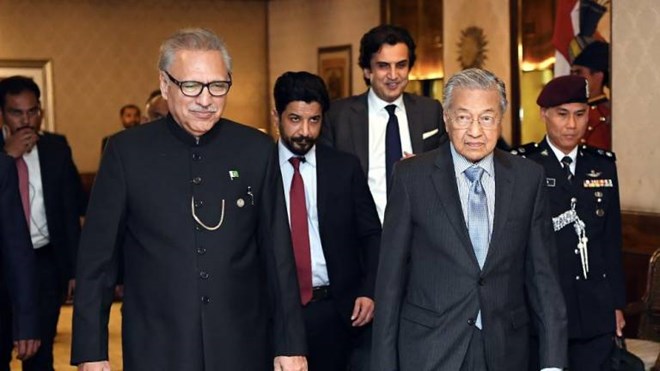Junaid Ali Malik |
It does not suit Pakistan to stay away from finding new friends around the world. I truly believe that this century belongs to Asia, more specifically to the countries that are a part of Association of Southeast Asian Nations (ASEAN) and South Asian Association for Regional Cooperation (SAARC). The condition in which SAARC is operating does not suit Pakistan though it includes the states that are next to it.
Afghanistan and Bangladesh are not willing to work with Pakistan. They lean towards India, majorly owing to our own failure on various fronts, one being leaving ground vacant for India to play and the other being finding faults in our own historical policies in regard to these countries. In spite of sacrificing a lot, an estimated financial loss of $100 billion and non-financial loss of around 50,000 lives, in the war that started in Afghanistan, Pakistan got only antagonism in consideration.
The existing government of PML-N and the upcoming one after the general elections of 2018 should deem relations with ASEAN fundamental. This would favor Pakistan strategically, economically and even socially.
The effects of war could have been averted, but they augmented. On the other side, Iran eschewed from the damage through astute foreign policy. It is also the neighbor of war-torn Afghanistan, but it managed its boundaries quite well and did not engage in any game that would destroy it economically, culturally, militarily, etc. Pakistan received only ignominy for distorted foreign policy.
Though the rulers, political and military dictators, kept on uttering that Afghanistan was our Muslim brother that would stand with us, but that had never been the case. Until when would we keep on lying to the nation? There are millions of Afghan refugees that are no less than a burden on the fragile economy of Pakistan, but they were warmly welcomed without pre-planning.
Read more: India-ASEAN Summit: India Showcasing The “Act East” Strategy”
Setting aside the past, it is time to find out partners from ASEAN. It is the home of about 550 million people whose living standard is rising with the passage of time. The region despite receiving the impacts of historical recessions remained stable and overall economy is on the rise. The current visit of Indonesian President Joko Widodo can be termed as a good omen.
They are emerging markets and want regional partners to join them in a bid to achieve economic prosperity. Lastly, the future of Pakistan can be secured only at the time when there will be strengthened relations with more and more states.
The Pakistani ruling elite should focus on increasing bilateral trade with Indonesia. One might not have heard of any top leader from Pakistan visiting Indonesia in the recent past, but now the substantial and meaningful tours to Indonesia should begin.
Signing of the preferential trade agreement (PTA) with Indonesia will ensure uncomplicated access to the Indonesian market. Currently, the trade between Pakistan and Indonesia stands at around $2 billion. There is a need to increase this volume and this would only happen at the time when serious efforts would be put to make space in the Indonesian economy. Moreover, in the same way, Indonesian investors and business entities should be given chances to explore the Pakistani market.
Read more: Persecution of Rohingya Muslims: Will ASEAN countries find a solution?
This relation should not be void of keeping into consideration the trade deficit. Last time PTA was signed in 2012 between the two countries, it went in favor of Indonesia. The other countries from which Pakistan can learn a lot and can boost its financial relations include: Malaysia, Singapore, the Philippines, and Thailand.
All the national stakeholders will also be interested in giving more space to the ten major countries of ASEAN. Though there is not any sort of possibility that Pakistan would become the member of ASEAN, there are vast chances of accelerating trade with its members.
Pakistan should make ASEAN realize its importance. It is the gateway to the Middle East and with the construction of railroad networks under the auspicious of CPEC, there will be ample opportunities to expand business relations and maintain financial well-being. It needs to have strong presence in all ten members of the organization. Unfortunately, no political party in the country extended warm relations with these states.
India has trade worth more than $12 billion with ASEAN while Pakistan’s trade stands at about $2 billion and that too is majorly in favor of the member states. Till this time, the trade volume of Pakistan with these states should have been at least $5 billion. Nonetheless, in the future, this goal can be achieved if political leadership is committed and cares more about Pakistan and its economy then their own. All the national stakeholders will also be interested in giving more space to the ten major countries of ASEAN.
Read more: China’s ‘great game’ in its near-abroad
Though there is not any sort of possibility that Pakistan would become the member of ASEAN, there are vast chances of accelerating trade with its members. They are emerging markets and want regional partners to join them in a bid to achieve economic prosperity.
Lastly, the future of Pakistan can be secured only at the time when there will be strengthened relations with more and more states. The existing government of PML-N and the upcoming one after the general elections of 2018 should deem relations with ASEAN fundamental. This would favor Pakistan strategically, economically and even socially.
Junaid Ali Malik is a professional writer. He considers writing is the sole purpose of his life. He has done masters in Commerce and History and holds PG Diploma in International Affairs. He is an entrepreneur by profession. He can be contacted at alimalikmalik627@gmail.com or @junaidalimalik1. The views expressed in this article are the author’s own and do not necessarily reflect Global Village Space’s editorial policy.














